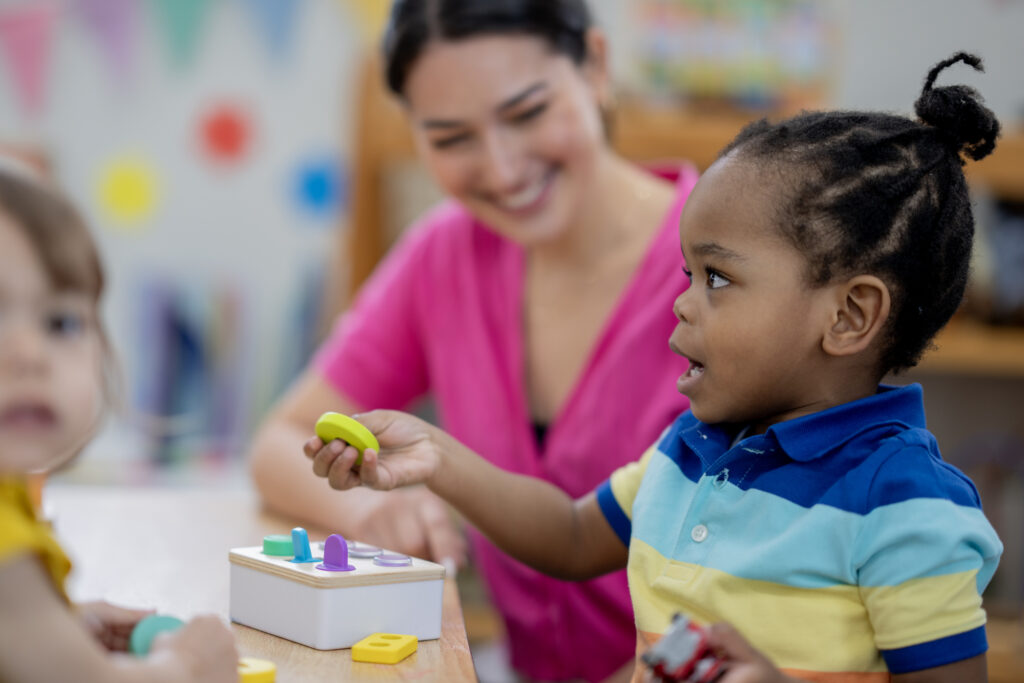In early childhood education, play-based learning is a vital approach that combines fun and educational activities to promote holistic development in children. Let’s explore what play-based learning is, why it’s important, the different types of play-based learning, and how Childcare Network incorporates play-based learning into its curriculum.
Introduction to play-based learning.
Play-based learning is an educational philosophy that builds off of children’s natural desire to play as a means of exploring, discovering, and making sense of the world around them. Unlike more traditional learning methods, play-based learning emphasizes active engagement, hands-on experiences, and child-directed exploration.
Through play, children are able to build a wide range of cognitive, social-emotional, physical, and creative abilities and skills that they carry through as they grow and develop.
Why is play-based learning important?
Play-based learning is crucial for several reasons, all of which impact a child’s development from infancy, toddlerhood, and young childhood:
- Play-based learning promotes active engagement and motivation, as children are naturally drawn to activities that are enjoyable and meaningful to them.
- Play-based learning allows for individualized instruction, as educators can tailor activities to meet the unique needs and interests of each child.
- Play-based learning also fosters creativity, problem-solving skills, and critical thinking abilities, preparing children for success in school and beyond.
Types of play-based learning.
Now that we’ve gained an understanding of play-based learning, we can explore the types of play-based learning. There are three primary types, each of which offer unique benefits for young children:
Child-led play.
In child-led play, children are given the opportunity to take the lead in selecting activities, setting goals, and directing their own learning experiences.
This type of play empowers children to make choices, solve problems, and take ownership of their learning journey. Child-led play includes activities like building with blocks, creating art, or engaging in imaginative play scenarios – also known as pretend play.
Adult-guided play.
Adult-guided play involves educators or parents supporting children’s learning experiences by providing encouragement. In this type of play-based learning, adults do not directly participate – rather, they observe and provide guidance as needed.
This means children maintain autonomy in their play – adults may offer suggestions, ask open-ended questions, or introduce new concepts to extend learning. This approach helps children develop independence, self-regulation, and social skills while still benefiting from adult support.
Adult-led play.
In adult-led play, educators and parents take a more active role in structuring the learning experience. This may involve leading group activities, demonstrating new skills or concepts, or providing direct instruction.
Adult-led play can be especially useful for introducing brand new concepts, modeling specific behaviors, or promoting learning objectives in a more structured environment.

Play-based learning activities.
Play-based learning activities encompass a wide range of experiences that engage children in meaningful, hands-on learning. Here are three general examples of play-based learning activities:
Imaginative play.
Imaginative play, also known as pretend or dramatic play, allows children to explore different roles, scenarios, and narratives as they play.
This can be a variety of things, from playing dress-up, pretending to be animals or superheroes, acting as a restaurant owner or chef, or creating imaginative worlds with dolls or action figures.
Sensory activities.
Sensory activities engage children/s senses (sight, hearing, touch, taste, and smell) to explore and learn about the world around them.
Examples of sensory play-based activities can include things like playing with bins filled with materials like rice or water, exploring different textures and materials, or engaging in sense-focused art activities like finger painting or clay modeling.
Outdoor activities.
As the name suggests, outdoor activities provide children with opportunities for physical activity, exploration, and connection with nature.
Examples include playing on playground equipment, exploring natural materials like sand, rocks, or leaves, or engaging in gross motor activities like running, jumping, and climbing.
How Childcare Network incorporates play-based learning.
At Childcare Network, play-based learning is a very important part of our overall educational approach.
Our proprietary HighReach Learning curriculum integrates play-based learning into every aspect of our program, providing children with a rich and dynamic learning environment. Whether you’re looking for a development-focused program for your infant, toddler, or school-age child – we tailor our curriculum to our students.
Through a variety of hands-on activities, interactive experiences, and child-directed exploration, we foster creativity, curiosity, and a love for learning in every child.
Learn more about Childcare Network.
Join us in providing your child with a fun, engaging, and educational learning experience. Explore our website today to find the nearest Childcare Network location to you and schedule a tour. Together, we can lay the foundation for your child’s future success and inspire a lifelong love for learning.



